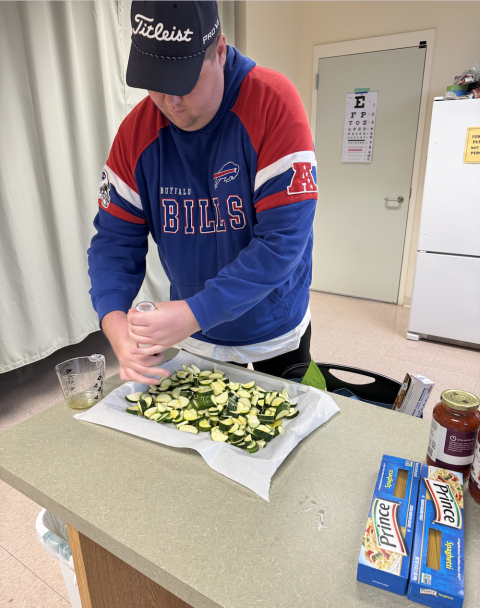Course Spotlight: Life Skills

Ever wonder what it’s like to make a real impact on someone else’s life? Students in UNH’s occupational therapy (M.S.) program get to experience this firsthand through their work with the Life Skills community group. Part of the Enabling Participation in Community Groups course, Life Skills brings together OT students and a group of 10 adults with developmental or intellectual disabilities to build confidence, practice essential life skills, and build community.
This fall, the group is led by teaching assistant Lauren Ferraro ’24G and OT students Mattea Citarella ’25G, Rachael Adams ’26G, Zee Immele ’25G, Kimberly Yuen ’26G, and Liz Gianetta ’25G.
“Adults with developmental or intellectual disabilities often have support while they’re in school, but once they leave, resources can be pretty limited,” says Ferraro. “They don’t have many ways to connect or build the social skills needed to form connections. This group fills a gap.”
What the Group Has Focused on this Semester
Creative expression has been a big focus this semester, with projects like rock painting and bracelet-making to boost motor skills and encourage emotional expression. On the practical side, students have guided members in meal preparation—taking trips to the grocery store to practice budgeting, then working together to cook up some great meals.
The group has also enjoyed special outings, including a visit to a therapeutic horse barn, and they’re wrapping up the semester with a small business venture to give members hands-on experience in planning, budgeting, and teamwork.
“We try to listen to the members as much as possible about what they like. For instance, they love games like kickball, and we even found out they enjoy playing hangman.” Immele says. “It’s all about working together to help them live their best lives. One of the best parts of being in OT is seeing what people can accomplish.”
Gianetta describes the group as a “safe space” where members can build confidence without fear of judgment. “For this population, there are sometimes biases from the community. Helping them express their feelings in ways that work for them is powerful. Some members struggle with words, so giving them ways to communicate how they feel is valuable—and amazing to watch.”
Adams adds, “It’s an opportunity for them to access a community that others might take for granted, as fewer inclusive spaces are available to them. We hope this can be a place where they build meaningful relationships with each other—even more so than with us or the staff.”
What Students Gain from the Group
The group offers students a chance to work with a population they might encounter in their future careers.
“This is a population I hadn’t worked with before, so not only does it fill a knowledge gap, but it’s a chance to be part of something meaningful,” says Citarella, who hopes this experience will help with her upcoming placement at the Krempels Brain Injury Center in Portsmouth. “Whatever setting I work in, I know I’ll encounter people with developmental disabilities, so learning how to support their needs is important to me.”
Yuen says she enjoys building rapport with adults and that relationship-building is essential in all fields of OT.
“Getting to know the members is amazing. They’ve known each other for so long that it can be intimidating at first, but every semester, they’re just as excited to get to know us as we are to know them. We catch up each morning over coffee or hot chocolate, and they always have so much to share.”